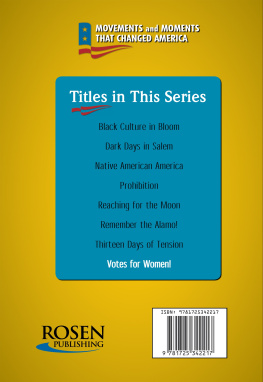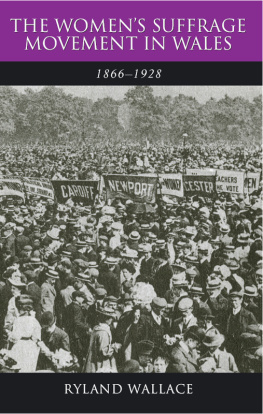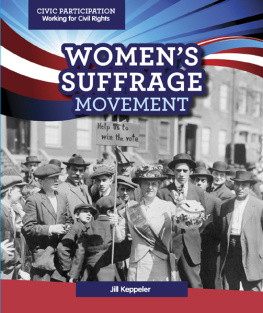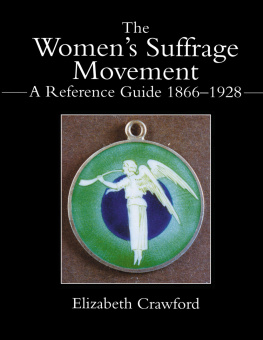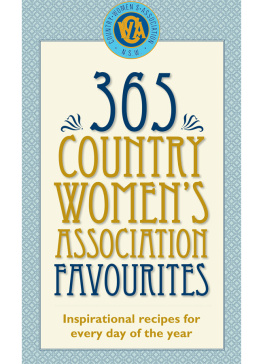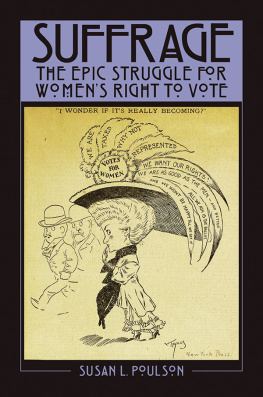WOMENS SUFFRAGE IN
WALES
LISA TIPPINGS
First published in Great Britain in 2019 by
Pen & Sword History
An imprint of
Pen & Sword Books Ltd
Yorkshire Philadelphia
Copyright Lisa Tippings, 2019
ISBN 978 1 52672 399 4
eISBN 978 1 52672 400 7
Mobi ISBN 978 1 52672 401 4
The right of Lisa Tippings to be identified as Author of this work has been asserted by her in accordance with the Copyright, Designs and Patents Act 1988.
A CIP catalogue record for this book is available from the British Library.
All rights reserved. No part of this book may be reproduced or transmitted in any form or by any means, electronic or mechanical including photocopying, recording or by any information storage and retrieval system, without permission from the Publisher in writing.
Pen & Sword Books Limited incorporates the imprints of Atlas, Archaeology, Aviation, Discovery, Family History, Fiction, History, Maritime, Military, Military Classics, Politics, Select, Transport, True Crime, Air World, Frontline Publishing, Leo Cooper, Remember When, Seaforth Publishing, The Praetorian Press, Wharncliffe Local History, Wharncliffe Transport, Wharncliffe True Crime and White Owl.
For a complete list of Pen & Sword titles please contact
PEN & SWORD BOOKS LIMITED
47 Church Street, Barnsley, South Yorkshire, S70 2AS, England
E-mail:
Website: www.pen-and-sword.co.u
Or
PEN AND SWORD BOOKS
1950 Lawrence Rd, Havertown, PA 19083, USA
E-mail:
Website: www.penandswordbooks.com
Acknowledgements
As a writer with a passion for the history of women in Wales, I feel extremely fortunate to have been given the opportunity to write this book. The womens suffrage movement in Wales is a part of the countrys history, which I have found particularly intriguing, and therefore I am immensely grateful to everyone at Pen and Sword for giving me the chance to expand my research further.
I am also, therefore, fortunate to belong to a family of tale-tellers, tradionalists who believe that the past is as important as our present. I was brought up hearing stories of my ancestors until the relatives I had never met, who died many years before I was born, seemed as alive as I was and for this I wish to thank my mum Ruth and my nan Mary. Although my nan is no longer with me, she is thought about every day. My dad is thanked for being there and for listening along to the stories. Even though he sometimes did so from behind a newspaper, we always knew he too was immersing himself in past lives. Thanks go also to my twin sister Emma. In many ways we are so different, but our shared history brings us closer together and for that I will always be grateful.
Thanks go to the many people I have talked to about their own family histories and who have been willing to share their personal memories. You are too numerous to mention but you know who you are and I am extremely grateful that you have allowed me to share some of your stories.
I wish to express my thanks to the Swansea Womens Institute, who permitted me to read some of my early material at a meeting. Members gave me some very encouraging feedback, which I found incredibly useful and which spurred me towards further research.
Finally, much love and thanks go to Nigel and Morgan, who have both been so supportive for the past few months in particular. Thank you for your endless encouragement and patience and your total belief in me and in my desire to bring the past to life.
CHAPTER ONE
Introduction
Home truths
I grew up in the south Wales valleys in the 1970s and, even though this was after the sexual revolution and the liberation movement of the 1960s, I was still surrounded by an odd mix of history and tradition. As I sat at my wooden desk in Brynmawr Board School in what was then known as the county of Gwent, my teacher Mr Fowlers History lessons taught me that female activists such as Emmeline Pankhurst and Emily Davison had fought hard to gain social equality for women. Along with other members of WSPU (the Womens Social and Political Union), they sought freedom from the restraints placed upon them by a patriarchal and reactionary society, one that was content to shackle women to the home and family, squashing their individual dreams and aspirations under piles of laundry and other household chores. My 10-year-old self was relieved to discover they had achieved success and it dawned on me that my mothers right to vote, a benefit I would share in less than eight years time, and my own ability to enter the job market on an equal footing with my male classmates, was down in the first instance to the sacrifices made by women such as Davison and Pankhurst.
Tradition, on the other hand, taught me that even in the 1970s, women in Wales were often confined to the narrow sphere of the family home. Very few of my classmates had mothers who worked, especially while their children were young. Men laboured long demanding hours in heavy industry, such as in the steel works or in one of the many coal mines still operational before their gradual demise during the 1980s, but most of their wives found themselves confined to the home, forced to take satisfaction from a life of daily chores and child-rearing. Those women who were able to leave the house to work tended to have roles that conformed to the stereotypes of the time, and found part-time employment in lower-paid jobs such as hairdressers, cleaners or receptionists.
This difference between the genders was reflected further in the working mens clubs and rugby clubs scattered throughout valley towns. Even in the very early nineties, when I was old enough to spend my weekends propping up the bars in such places, there were still rooms to which I was forbidden entrance. As a young woman I was welcome to sit in the bar and positively encouraged to part with my money, but certain side rooms remained strictly off-limits. They were as difficult to penetrate as the Pentagon, but only if you were a woman. These were shady, dingy poke holes filled with acrid smoke and the stale stench of beer. They were also the high courts of valley towns, where men repositioned the whole of the Welsh rugby team and scoffed and spat at the state of current politics. Such spaces allowed men the opportunity to indulge in the twentieth-century equivalent of a nineteenth-century phenomenon male banter over a port and a cigar. Here was the chance to put the world to rights while enjoying an alcoholic beverage and the inhalation of nicotine confident in the knowledge that women had politely withdrawn to a more genteel room to idly gossip. Over a hundred years may have passed, but men still needed a space of their own away from the company of the women in their lives, rooms in which they felt free to swear, laugh, leer and moan.
One issue, however, continued to puzzle me. Whether playing on the rugby pitch or watching from the side-lines, men were lions. They roared, they stamped and they swore. They were the rough-cut kings of the turf and born leaders. But among the humdrum of everyday domestic life, it was the wives who not only made the rules but who also ensured they were implemented. Such women were just as likely to wave their rolling pins in the face of any miscreant husband as they were to use them to roll out pastry. While I was growing up I was left in little doubt as to which adult was really in charge in my own home or, indeed, in any of the houses of the friends I visited. Husbands may have been the ones who earned the highest weekly wage, but on pay-day it was their wives to whom many men mildly handed over the opaque packet containing a wad of five- and ten-pound notes and it was their wives who allocated the money on a needs-must basis. Payment for the rent man came first, followed by money for bills, shopping next, and if he was lucky any leftovers would be handed back to the husband as drinking money for the weekend. This allocation of money was no easy task and debunks the perpetual myth of a matriarchal Wales that has at times been projected through the media. Wives and mothers were strong because they needed to be, and because society and history has not always been on the side of the female. Women were often in the position of needing to prove themselves, even in the latter years of the twentieth century. And I know from personal experience and from watching my own mum completing such a creative task that juggling a weekly wage that has suddenly shrunk to a three-day wage due to factory cutbacks is never easy. Anyone who has ever had to do it deserves more credit than they will probably ever receive.



